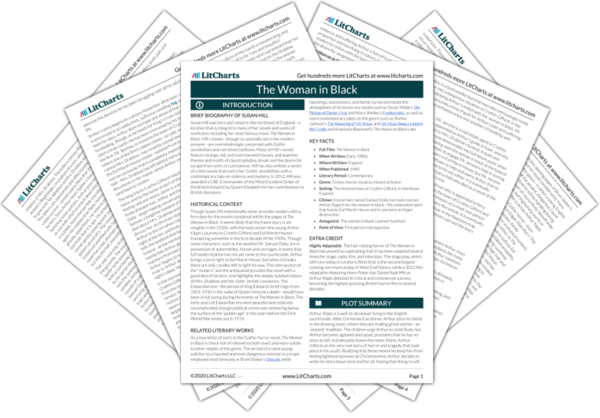Gothic Horror
Susan Hill’s The Woman in Black is saturated with references to popular Gothic horror novels. Though written in the mid-1980s rather than the late eighteenth century, The Woman in Black is in many ways a classic Gothic novel—and a love letter to the genre, which spawned emotionally and atmospherically evocative classics such as Mary Shelley’s Frankenstein. Through her reliance upon Gothic horror tropes throughout protagonist Arthur Kipps’s story, Hill is able to fulfill…
read analysis of Gothic HorrorStorytelling
The Woman in Black is a story within a story within a story. The protagonist, Arthur Kipps, is prompted to share a ghost story during his family’s Christmas Eve celebration one year, but the only ghost story he knows is unfortunately true—and more macabre and upsetting than his family is perhaps prepared for. Confronted with an incident from his past he has fought so hard to shake, Arthur realizes he must at last face…
read analysis of StorytellingThe Past
The past is such a forceful presence within Susan Hill’s The Woman in Black that it is almost a character in and of itself. The novel’s frame story forces protagonist Arthur Kipps to mentally return to his own past and confront his time as a young lawyer spending a fateful week at Eel Marsh House; during his tenure in Crythin Gifford, his younger self was similarly forced to confront the dark history of the haunted…
read analysis of The Past
Isolation and Trauma
The story at the dark heart of The Woman in Black is that not of protagonist Arthur Kipps, but of Jennet Humfrye—the titular spirit who, after having been forced to give up her illegitimate son to the care of her sister and brother-in-law, now haunts her late sister’s isolated estate, Eel Marsh House. As Jennet’s chilling, painful story—which culminates in the death of her son and her own descent into madness—emerges piece by…
read analysis of Isolation and Trauma






